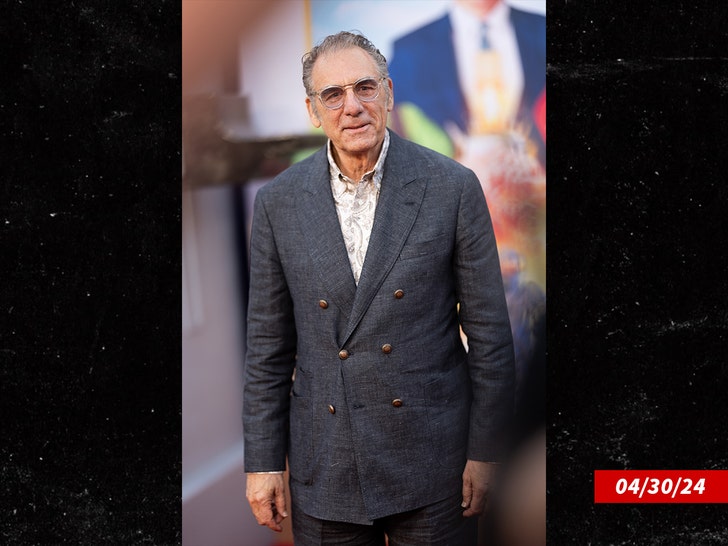Lifestyle
Renowned painter and pioneer of minimalism Frank Stella dies at 87

Frank Stella with one of his works at the Royal Academy’s Summer Exhibition in London in 2000.
Ian Nicholson/PA Images via Getty Images
hide caption
toggle caption
Ian Nicholson/PA Images via Getty Images

Frank Stella with one of his works at the Royal Academy’s Summer Exhibition in London in 2000.
Ian Nicholson/PA Images via Getty Images
Renowned minimalist painter Frank Stella died Saturday of lymphoma at his home in Manhattan, N.Y. The artist was 87 years old.
Stella’s representative, Marianne Boesky Gallery in New York, confirmed the news with NPR.
“Marianne Boesky began representing Stella in 2014, and the gallery is deeply grateful for a decade of collaboration with the artist and his studio,” Boesky said in a statement shared with NPR. “It has been a great honor to work with Frank for this past decade. His is a remarkable legacy, and he will be missed.”
One of the most influential American artists of his time, Stella was a pioneer of the minimalist movement of the early 1960s. During that time, painters and sculptors challenged the idea that art was meant to be representative and used their medium as their message.

Instead of representing three-dimensional worlds through the canvas, some of Stella’s early artworks reflected his desire to have an immediate visual impact upon viewers. A series titled Black Paintings used parallel black stripes to prompt awareness of the painting as a two-dimensional surface. As Stella once gnomically stated, “What you see is what you see.”

Stella’s Die Fahne hoch! (1959) is part of a series of paintings that earned the artist notoriety in the 1950s.
2015 Frank Stella/Artists Rights Society (ARS), New York. Digital Image
hide caption
toggle caption
2015 Frank Stella/Artists Rights Society (ARS), New York. Digital Image

Stella’s Die Fahne hoch! (1959) is part of a series of paintings that earned the artist notoriety in the 1950s.
2015 Frank Stella/Artists Rights Society (ARS), New York. Digital Image
“It was about being able to make an abstract painting that really wasn’t based on anything but the gesture of making itself, which was the gesture of making the painting,” Stella Terry Gross in a Fresh Air interview in 2000.
Frank Stella was born into a middle-class Italian American family. His father was a gynecologist who painted houses during the Great Depression and his mother was a housewife and artist. Young Stella grew up surrounded by paint; amongst his mother’s artworks and helping his father whenever he repainted his own home. “I always liked paint,” he told Gross, “the physicality of it.”
He started exploring paint more professionally when he was in high school in Massachusetts under the supervision of abstractionist painter Patrick Morgan, who taught there. Even while studying history as a Princeton undergraduate, Stella continued taking art classes. Through his Ivy League connections, Stella was introduced to the art world of New York City, which started to shape his early artistic vision as he encountered artists such as Jackson Pollock and Franz Kline, who would become some of his most admired influences.
“I really wanted more than anything to make art that was as good as the good artists were making. I wanted to make art that someday — and I didn’t expect it to be that way right away — that it would be as good as [Willem] de Kooning or Kline or [Barnett] Newman or Pollock or [Mark] Rothko. They were my heroes and I wanted to make art that was as good as them,” he told Fresh Air.

A 2014 sculpture by Frank Stella entitled Inflated Star and Wooden Star in the courtyard at the Royal Academy of Arts on Feb. 18, 2015, in London.
Ben Stansall/AFP via Getty Images
hide caption
toggle caption
Ben Stansall/AFP via Getty Images

A 2014 sculpture by Frank Stella entitled Inflated Star and Wooden Star in the courtyard at the Royal Academy of Arts on Feb. 18, 2015, in London.
Ben Stansall/AFP via Getty Images
When Stella was only 23, he made his debut at New York’s Museum of Modern Art. And soon after his series Black Paintings, which he started in 1958, Stella created two more series, Aluminum Paintings (1960) and Copper Paintings (1960-61), that committed to the idea that the art was in the medium and was, as he told The Guardian in 2015, supposed to be “fairly straightforward.”
In 1970, when he was 33 years old, Stella became the youngest artist ever to receive a retrospective at New York’s Museum of Modern Art. His exhibition covered a decade of his drawings and paintings and emphasized his originality in simplicity.
In the 1990s, Stella’s work evolved from the canvas to colorful geometrical configurations and sculptures. He started using computer technology and architectural rendering to incorporate digital images into his work. His Moby Dick series, a set of paintings, lithographs, and sculptures, took their titles from chapters of Herman Melville’s classic novel. According to the Princeton University Art Museum, the series was Stella’s “most ambitious artistic endeavor … [that] pushes the boundaries between printmaking, painting, and sculpture.”

Visitors walk past the installation The Honor and Glory of Whaling (1991) by Frank Stella in the Folkwang Museum in Essen, Germany, in 2010.
Volker Hartmann/DDP/AFP via Getty Images
hide caption
toggle caption
Volker Hartmann/DDP/AFP via Getty Images

Visitors walk past the installation The Honor and Glory of Whaling (1991) by Frank Stella in the Folkwang Museum in Essen, Germany, in 2010.
Volker Hartmann/DDP/AFP via Getty Images
A straightforward, rather blunt artist, Stella never really cared about what others thought of him — or of his art. But his six-decade career inspired generations of artists, including painter Julie Mehretu. “Once I really started to understand his work and follow it, there’s a certain type of invention and playfulness and extreme rigor with which he kept going forward,” she said in a 2015 NPR interview.
Stella’s numerous awards and accolades included the National Medal of Arts, the country’s highest honor for artistic excellence, in 2009, and the 2011 Lifetime Achievement in Contemporary Sculpture Award from the International Sculpture Center.

Lifestyle
The Real Housewife-ification of Congress; And, 25 years of being pilled by The Matrix : It's Been a Minute

Representatives Jasmine Crockett and Marjorie Taylor Greene.
Jemal Countess; Drew Angerer/Getty Images; BFA / Warner Bros
hide caption
toggle caption
Jemal Countess; Drew Angerer/Getty Images; BFA / Warner Bros

Representatives Jasmine Crockett and Marjorie Taylor Greene.
Jemal Countess; Drew Angerer/Getty Images; BFA / Warner Bros
Representatives Marjorie Taylor Greene and Jasmine Crockett exchanged heated words on the House floor. Greene commented on Crockett’s eyelashes, and Crockett referred to Greene’s body as “butch.” We dive into the history of these two attacks, and look at what history the two representatives were pulling from — from misogynoir to transphobia. And what does this about what we want from our politicians?
Then, ‘The Matrix’ came out 25 years ago, and became an instant classic. It’s a powerful story for both trans people and incels who “took the red pill.” What makes the movie’s core metaphor so widely appealing (and widely applicable)?
This episode was produced by Barton Girdwood and Liam McBain. It was edited by Jessica Placzek and Sara Sarasohn. Engineering support came from Tiffany Vera Castro. Our executive producer is Veralyn Williams. Our VP of programming is Yolanda Sangweni.
Lifestyle
Laugh Factory Owner Says He'd Consider Lifting Michael Richards Ban

Michael Richards‘ Laugh Factory ban could come to an end … ’cause the owner’s open to having him back — if he’s truly learned the error of his ways.
Jamie Masada — owner of the iconic comedy joint in Hollywood — tells TMZ … he booted the actor-comedian for good after his infamous 2006 rant at the club because he believes hate speech isn’t acceptable, so Michael earned himself the ban for his racist remarks.

But, Masada says he believes in second chances and doesn’t want to hold a grudge, so Michael could make a return to the venue … but, only if he’s truly a reformed man.
As we reported … Richards told People he’s not looking to make a comeback by stepping back into the limelight with his new book and public appearances — while also maintaining he’s never been a racist, despite his reprehensible rant.

Worth noting … Richards reportedly says in his book, he and the heckler who said he wasn’t funny both “ended up at the bottom of the barrel” — which Masada’s kinda calling BS on.
Jamie says he was at the club the night everything went down … and the group wasn’t actually heckling Richards, but simply talking during his set.
When Michael demanded they tell the room what they were talking about, one of the men told him he wasn’t funny … then Michael totally lost it, repeatedly screaming the n-word. Jamie doesn’t think their actions were equal at all.
Michael may say he’s not looking for a comeback … but sounds like some people may give him the chance to make it — if he’s ready to show he’s changed.
Lifestyle
‘It is time to break up Live Nation-Ticketmaster’: Justice Department sues concert ticket behemoth

Penny Harrison and her son Parker Harrison rally against the live entertainment ticket industry outside the U.S. Capitol last year.
Drew Angerer/Getty Images/Getty Images North America
hide caption
toggle caption
Drew Angerer/Getty Images/Getty Images North America
The Department of Justice and 30 state and district attorneys general across the country filed a federal lawsuit Thursday against Live Nation Entertainment and its wholly owned subsidiary Ticketmaster. The suit alleges that Live Nation has created a monopoly on live event ticket prices across the United States. The civil antitrust suit was filed in the Southern District of New York.
This fight has been long in coming: Music fans and other consumers, performers, independent venues and even members of Congress have argued that Ticketmaster, which merged with Live Nation in 2010, had artificially pushed ticket prices sky-high. Live Nation has long been a dominant player in the live event marketplace, with substantial holdings in venues, concert promotions, music festivals, ticketing, sponsorship, advertising and artist management – holding so much power across so many aspects of the business, the Justice Department alleges, that it is effectively able to limit its competition.
If successful, this suit could reshape the live event landscape – and the prices fans pay to see their favorite performers – across the country.
The state and district attorneys general joining the suit include several states that are home to major live event venues, including those of New York, California, Colorado, Florida and Texas.
In a lengthy statement provided to NPR on Thursday, Live Nation wrote in part: “The DOJ’s lawsuit won’t solve the issues fans care about relating to ticket prices, service fees, and access to in-demand shows. Calling Ticketmaster a monopoly may be a PR win for the DOJ in the short term, but it will lose in court because it ignores the basic economics of live entertainment, such as the fact that the bulk of service fees got to venues, and that competition has steadily eroded Ticketmaster’s market share and profit margin.”
Within the suit, the Department of Justice and the states allege that Live Nation and Ticketmaster engaged in several forms of anticompetitive conduct, including retaliating against other promotion companies and venues that worked with its rivals; locking out competitors with long-term, exclusive ticketing contracts; restricting musicians’ access to live event venues; and strategically acquiring smaller, independent companies that Live Nation allegedly perceived as threats to its dominance.
Earlier this month, in a bid to increase transparency for consumers, the House of Representatives passed the TICKET Act, which would force Live Nation and other ticket sellers to list all the costs and fees within a live event ticket price. The bill, which was introduced in the Senate by Ted Cruz of Texas, has been supported by hundreds of prominent musicians, including Billie Eilish, Dave Matthews and Nile Rodgers, who wrote in a joint statement: “We are joining together to say that the current system is broken: predatory resellers and secondary platforms engage in deceptive ticketing practices to inflate ticket prices and deprive fans of the chance to see their favorite artists at a fair price.”
According to Thursday’s filing, Live Nation Entertainment currently owns or controls over 250 concert venues across North America, and controls around 60 percent of concert promotions at major concert venues across the U.S. The company also directly manages more than 400 musical acts.
In the suit, the Department of Justice and the states asserted: “With this vast scope of power comes influence. Live Nation and its wholly owned subsidiary, Ticketmaster, have used that power and influence to insert themselves at the center and the edges of virtually every aspect of the live music ecosystem.”
“It is time to break up Live Nation-Ticketmaster,” said Attorney General Merrick Garland in a statement.
In the past, and again in its statement to NPR on Thursday, Live Nation argued that musicians — not its own company — are the ones to ultimately set their own ticket prices. Live Nation executive vice president of corporate and regulatory affairs Dan Wall said that the suit “ignores everything that is actually responsible for higher ticket prices, from increasing production costs to artist popularity, to 24/7 online ticket scalping that reveals the public’s willingness to pay far more than [what] primary tickets cost.”
“It is not surprising that Live Nation has pointed its finger at artists,” a senior Justice official said on background on Thursday morning. “In an industry in which artists have historically been squeezed for compensation for their creative work, it’s important that artists are properly compensated.”
“To us, that’s a little bit of a red herring,” the official continued, referring to Live Nation’s previous argument. “How is the system set up? How is Live Nation’s control at all levels of the system allowing for a process that’s distorted in part by Live Nation’s power?”
The DOJ is pressing for “structural relief” – that is, it is asking the federal court to break up the Live Nation-Ticketmaster combined company, which the DOJ itself had approved in the 2010 merger. Justice Department officials are now arguing that since the merger, Live Nation has created a stranglehold on the live event industry.
Thursday’s case is the latest lawsuit by the Biden administration against major corporations that it has accused of abusing monopoly power. The Justice Department and the Federal Trade Commission have sued Apple, Google and Amazon. They’ve successfully stopped the mergers of publishers Penguin Random House and Simon & Schuster and of JetBlue Airways with Spirit Airlines. They’ve also unraveled a partnership between JetBlue and American Airlines.
Last year, however, federal officials lost their bids to block the merger of Microsoft and videogame giant Activision Blizzard; of Facebook parent Meta with virtual-reality company Within Unlimited; and of insurer UnitedHealth Group with tech firm Change Healthcare.
“While we do not comment on specific enforcement matters, President Biden strongly supports fair and robust enforcement of the antitrust laws,” said White House Press Secretary Karine Jean-Pierre in a statement Thursday. “The President launched the Strike Force on Unfair and Illegal Pricing because no American should pay higher prices or lose choices because companies break the law and engage in anti-competitive practices. His Administration has taken action to fight corporate greed by banning hidden junk fees—including event tickets—that unfairly increase prices for hardworking families trying to make ends meet. As the President has said, the American people are tired of being played for suckers.”
The announcement of the federal antitrust suit against Live Nation is just a first step in what will almost certainly be a long court process, so music fans likely won’t encounter lower ticket prices any time soon.
With additional reporting by Alina Selyukh.
-

 Politics1 week ago
Politics1 week agoSouthern border migrant encounters decrease slightly but gotaways still surge under Biden
-

 Politics1 week ago
Politics1 week agoDem newcomer aims for history with primary win over wealthy controversial congressman
-

 World1 week ago
World1 week agoSlovakia PM Robert Fico in ‘very serious’ condition after being shot
-

 World1 week ago
World1 week agoCanadian Nobel-winning author Alice Munro dies aged 92
-

 Politics1 week ago
Politics1 week agoVulnerable Dem incumbents move to the center in key swing states as Biden panders to far-left base
-

 News1 week ago
News1 week agoDespite state bans, abortions nationwide are up, driven by telehealth
-

 News1 week ago
News1 week agoSmall but mighty Nimble becomes first mixed-breed dog to win Westminster agility title
-

 World1 week ago
World1 week ago‘Monstrous crime’: World reacts to attack on Slovakia’s prime minister















